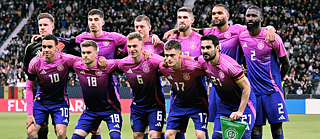This summer, everything will revolve around the men’s European Football Championship in Germany – which will involve 24 nations, ten cities and millions of fans. We have put together the key facts about the tournament to fully prepare you for your next evening at the pub.
Another summer fairy tale, perhaps?
After over 30 years, the men’s European Football Championship – EURO 2024 – will be hosted by Germany again this summer. The tournament begins on 14 June when Germany plays Scotland in Munich, and the final will take place in Berlin on 14 July. The last time Germany hosted a major football tournament was the Women’s World Cup in 2011. However, what many people remember above all is the last major men’s tournament: the 2006 World Cup that became known in Germany as the “summer fairy tale” and is greatly idealized. Later, research revealed that Germany’s selection as host may well have been unlawful. But back to the European Championship: in total, Germany has so far hosted a EURO tournament three times: a women’s championship twice and a men’s tournament once. Both national teams are record-breaking European champions. The women have won eight times, while the men have bagged the title three times – a record they share with Spain.
24 nations, ten cities
24 teams are taking part in EURO 2024. In six groups, they will initially play against each other in a preliminary stage. Because the teams are seeded for the draw, this gives successful countries a competitive advantage by ensuring that the favourites cannot knock one another out too early. The German squad will play in a group with Scotland, Hungary and Switzerland. The teams that come first and second will qualify for the round of 16, as will the two best third-placed teams from the group stage. Matches will be played in ten cities: Munich, Berlin, Dortmund, Stuttgart, Hamburg, Gelsenkirchen, Dusseldorf, Leipzig, Cologne and Frankfurt. The biggest stadium is in Berlin, with seating for 70,000 – with its huge curved terrace, Dortmund’s stadium could host even more fans, but this section will not be used during EURO 2024 – while the smallest is Leipzig with 42,000 seats. Leipzig is also the only venue in the former East Germany. In total, 2.7 million tickets are available for fans.
A new country joins the tournament
EURO 2024 will be a very special tournament for one country in particular, as Georgia has qualified for the first time ever. Against the backdrop of the Russian inivasion, EURO 2024 will be anything but a run-of-the-mill championship for Ukraine, either. The war in Ukraine is also reflected in the group of participants: the European states excluded Russia from the tournament.
The motto is fair play
The German tournament organizers are advertising the fact that EURO 2024 will be a “home game for human rights”. For example, the European football association UEFA has undertaken to comply with Germany’s Supply Chain Act when football shirts are manufactured abroad so as to prevent child labour and unfair wages. In addition, workers, fans and journalists will be able to file a complaint if their rights are violated. And ticket holders will be able to use local public transport free of charge and intercity transport at reduced rates on match days. The EURO groups have been divided up into regional clusters so as to ensure shorter and thus more sustainable travel. That said, social and ecological pledges are very much part of the standard marketing repertoire for major tournaments these days.
As green as it’s going to get
There has been some criticism of the way the human rights concept has been implemented. Experts believe that Germany’s concept came too late, as much of the tournament preparation had already happened. The promise that the championship would be the “greenest EURO of all time” was likewise criticized: on behalf of the German government, the Öko-Institut calculated that the tournament would emit roughly 490,000 tonnes of carbon equivalent, which is comparable to the levels seen at past championships.
What are Germany’s chances?
In Germany, the German Football Association (DFB) is hoping that EURO 2024 will help improve its image, which has been tarnished by corruption and a lack of success on the pitch. After a poor showing in three major tournaments, the German men’s team has had a new manager since 2023: Julian Nagelsmann. Just 36 years old, Nagelsmann is considered a star in the world of football. Signing him – also beyond EURO 2024 – was a real coup for the DFB. He has given many new players a chance. A number of marketing campaigns such as the very successful pink away kit and a self-deprecating ad have helped make the team more likeable again of late. In surveys conducted in the spring of 2024, 28 percent of Germans even believed that a EURO win was on the cards.
06/2024
